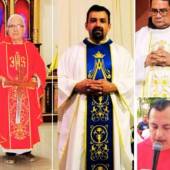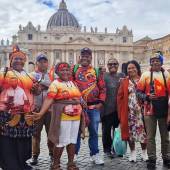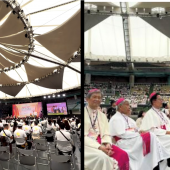Ortega government orders dissolution of Missionaries of Charity in Nicaragua

The Nicaraguan Ministry of the Interior has ordered the closure of 101 nongovernmental organizations, including the Missionaries of Charity, the congregation founded by St. Teresa of Calcutta that is dedicated to serving the poorest of the poor.
The order to shut down the 101 NGOs was requested by Sandinista legislator Filiberto Rodríguez in a June 22 letter presented to the National Assembly, the country’s legislature.
The document submitted by Rodríguez and released by the Nicaraguan media outlet Confidencial is titled “The Legislative Decree Initiative for the Cancellation of the Legal Personality of Various Associations/Foundations, requested by the National Directorate of Registration and Control of Non-Profit Organizations following due process of law.”
The text, which could be debated by the National Assembly in the coming days, states that the Missionaries of Charity “has failed to comply with its obligations” according to the law that regulates nonprofit organizations, the money-laundering law, the financing of terrorism, and the financing of proliferation of weapons of mass destruction.
According to the government of Daniel Ortega, the missionaries are not accredited “by the Ministry for the Family to function as a nursery-center for childhood development, home for girls, and home for the elderly,” nor “do they have an operating permit from the Ministry of Education to provide remedial education for students” and their “financial statements reported to the Ministry of the Interior don’t agree” with other documents presented for review.
The list of organizations the government has ordered to shut down also includes the Catholic Foundation for Human Development Assistance for Nicaraguans, the Spirituality Foundation for Children of Nicaragua, the My Childhood Mothers Foundation, and the Diriomito Children’s Care Home Association, among others.
According to the EFE news agency, the Missionaries of Charity Association was created Aug. 16, 1988, and opened following the visit Mother Teresa made to Nicaragua during the first term of Daniel Ortega (1985–1990). The Sandinista regime had already been in power since 1979 when President Anastasio Somoza was overthrown.
The Missionaries of Charity run the Immaculate Heart of Mary Home in the city of Granada, where they take in abandoned adolescents or victims of abuse.
In addition to spiritual and psychological help, minors receive regular classes in music, theater, sewing, beauty, and other trades.
In the capital, Managua, the nuns run a nursing home, which provides the elderly with food, clothing, and other care.
The Missionaries of Charity also provide remedial education for minors at risk and run a nursery for poor children, mostly children of single mothers and street vendors.
The National Assembly still has to approve the order. However, President Ortega’s Sandinista National Liberation Front political party holds 75 out of the 90 seats, so it is expected to be approved.
Managua Auxiliary Bishop Silvio José Báez, who has been living in exile at the request of Pope Francis since April 2019 due to numerous death threats, deplored the decision of the Ortega government to expel the Missionaries of Charity from the country.
Bishop Báez wrote on Twitter from Miami: “It makes me very sad that the dictatorship has forced the Missionaries of Charity of Teresa of Calcutta to leave the country. Nothing justifies depriving the poor of charitable care.”
In fewer than four years, the Catholic Church in Nicaragua has been the target of 190 attacks and desecrations, including a fire in the Managua Cathedral, as well as police harassment and persecution of bishops and priests under the Ortega government.
This story was first published by ACI Prensa, CNA’s Spanish-language news partner. It has been translated and adapted by CNA.
Radio Veritas Asia (RVA), a media platform of the Catholic Church, aims to share Christ. RVA started in 1969 as a continental Catholic radio station to serve Asian countries in their respective local language, thus earning the tag “the Voice of Asian Christianity.” Responding to the emerging context, RVA embraced media platforms to connect with the global Asian audience via its 21 language websites and various social media platforms.














